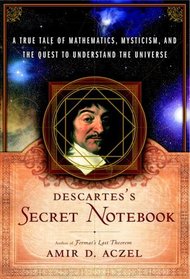American Library Assoc. says: "Aczel's new episode from mathematical history concerns an enigmatic manuscript by Rene Descartes. It survives in a partial copy made by Gottfried Leibniz. The author makes the discovery of the reason Leibniz neglected to copy the manuscript in its entirety a method for enticing readers into his well-paced narrative. Framed by Descartes' languid lifestyle--living on inherited wealth, he slept late, dressed fashionably, and wandered about Europe--the story centers on Descartes' penchant for secrecy. Living in an age of intolerance and the Thirty Years' War, he had ample inducement to be cautious about his philosophical speculations, but desiring intellectual socializing, he joined, Aczel indicates, the Brotherhood of the Rosy Cross. A secret society, the Rosicrucians furnish more a mystical mood than evidence in Aczel's mystery hunt, which pursues what was in that lost writing of Descartes. Laying clues, he describes the philosopher's interest in the geometry of cosmic space". This is all true, but the style is a bit dry.
Search -
Descartes's Secret Notebook : A True Tale of Mathematics, Mysticism, and the Quest to Understand the Universe
Descartes's Secret Notebook A True Tale of Mathematics Mysticism and the Quest to Understand the Universe
Author:
René Descartes (1596—1650) is one of the towering and central figures in Western philosophy and mathematics. His apothegm “Cogito, ergo sum” marked the birth of the mind-body problem, while his creation of so-called Cartesian coordinates has made our intellectual conquest of physical space possible. — But Descartes had a mysteri... more »
Author:
René Descartes (1596—1650) is one of the towering and central figures in Western philosophy and mathematics. His apothegm “Cogito, ergo sum” marked the birth of the mind-body problem, while his creation of so-called Cartesian coordinates has made our intellectual conquest of physical space possible. — But Descartes had a mysteri... more »
ISBN-13: 9780767920339
ISBN-10: 0767920333
Publication Date: 10/11/2005
Pages: 288
Rating: 3
ISBN-10: 0767920333
Publication Date: 10/11/2005
Pages: 288
Rating: 3
3.5 stars, based on 3 ratings
Publisher: Broadway
Book Type: Hardcover
Other Versions: Paperback
Members Wishing: 0
Reviews: Member | Amazon | Write a Review
Book Type: Hardcover
Other Versions: Paperback
Members Wishing: 0
Reviews: Member | Amazon | Write a Review
Please Log in to Rate these Book Reviews
Genres:
- Biographies & Memoirs >> General
- Biographies & Memoirs >> Professionals & Academics >> Philosophers
- Biographies & Memoirs >> Professionals & Academics >> Scientists
- Science & Math >> General
- Science & Math >> Mathematics >> History




